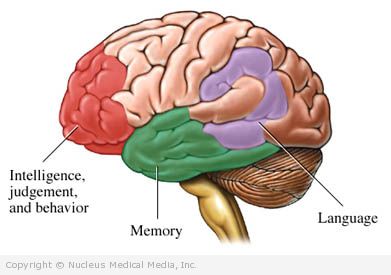Alzheimer’s Disease
(Alzheimer’s Dementia)
Alzheimer’s Disease – Definition
Alzheimer’s disease is a condition that destroys brain cells. People with this disease slowly lose the ability to learn, function, and remember. It is the most common cause of dementia. Dementia is a loss in mental abilities that is great enough to interfere with daily life.
Alzheimer’s Disease – Causes
The cause of Alzheimer’s is not yet known. Two factors that may play a role in the development of Alzheimer’s disease are:
- Plaques — abnormal deposits of a substance called beta amyloid in different areas of the brain
- Neurofibrillary tangles — twisted fibers (called tau fibers) within the nerve cells
Alzheimer’s Disease – Risk Factors
Factors that may increase your chance of Alzheimer’s disease include:
- Age: 65 and older
- Previous serious, traumatic brain injury
- Lower educational achievement
- Down’s syndrome
- Down’s syndrome in a first-degree relative
- Women under 35 who give birth to a child with Down’s syndrome
- Smoking
- Family history of Alzheimer’s disease
- Presence of a certain variety type of protein (APOE-e4)
- Depression
- Elevated levels of homocysteine
- Heart disease
Researchers are studying the following to see if they are related to Alzheimer’s disease:
- Poor nutrition and vitamin deficiency in childhood
- Excess metal in the blood, especially zinc, copper, aluminum, and iron
- Certain viral infections
- Diabetes
- High Cholesterol
Alzheimer’s Disease – Symptoms
The disease begins as mild memory lapses. It will continue toward a profound loss of memory and function. Alzheimer’s disease is divided into three stages:
- Early — you may notice loss of memory, reasoning, understanding, or learning but it does not interfere with independence
- Intermediate — increased mental loss, personality changes, and increased dependence on others for basic needs
- Severe — loss of personality and bodily functions with total dependence on others for care
Symptoms include:
- Increasing trouble remembering things, such as:
- How to get to familiar locations
- What the names of family and friends are
- Where common objects are usually kept
- How to do simple math
- How to do usual tasks, such as cooking, dressing, bathing, etc.
- Having difficulty concentrating on tasks
- Having difficulty completing sentences due to lost/forgotten words (may progress to complete inability to speak)
- Forgetting the date, time of day, season
- Getting lost in familiar surroundings
- Having mood swings
- Being withdrawn, losing interest in usual activities
- Having personality changes
- Walking in a slow, shuffling way
- Having poor coordination
- Losing purposeful movement
Alzheimer’s Disease – Diagnosis
There are no tests to confirm Alzheimer’s. The doctor will ask about your symptoms and medical history. A physical exam will be done. The doctor will ask many questions. This will help to rule out other causes.
Tests to rule out other medical conditions may include:
- Neurological exam — tests of your nervous system
- Psychological and mental status testing
- CT scan — a type of x-ray that uses a computer to make pictures of the brain
- MRI scan — a test that uses magnetic waves to make pictures of the brain
- Electroencephalogram (EEG) — a test that measures electrical currents in the brain
- Blood tests and urine tests
- Lumbar puncture — to test for levels of certain brain proteins that increase with Alzheimer’s disease and to rule out other disorders
- PET scan of the brain — a test that makes images showing activity in the brain
Alzheimer’s Disease – Treatment
There is no cure for Alzheimer’s disease. There are no certain ways to slow its progression. Four medicines are available to treat some of the symptoms. Other drugs are being studied. The goal is to find a medicine that can manage the symptoms or slow the condition’s course.
Medications for Symptoms and Disease Progression
Only two types of medicines have been approved to reduce the symptoms of Alzheimer’s disease:
- Cholinesterase inhibitors—recommended for mild to moderate Alzheimer’s disease (may be called donepezil [Aricept], rivastigmine [Exelon], galantamine [Reminyl])
- N-methyl-D-aspartate (NMDA) receptor antagonist—for moderate to severe Alzheimer’s disease (may be called memantine)
Treatments that are being studied include:
- Gamma-secretase inhibitors
- Tau fiber aggregation inhibitors
- Herbs and supplements (such as vitamin E, ginkgo biloba)
Lifestyle Management
Managing the disease includes:
- Creating an environment in which you can receive the care you need
- Keeping your quality of life as high as possible
- Keeping yourself safe
- Helping yourself learn to deal with the frustration of your uncontrollable behavior
- Providing a calm, quiet, predictable environment
- Providing appropriate eyewear and hearing aids, easy-to-read clocks and calendars
- Playing quiet music
- Doing light, appropriate exercise to reduce agitation and relieve depression
- Encouraging family and close friends to visit frequently
Psychiatric Medication
Psychiatric symptoms may occur with Alzheimer’s disease. Your doctor may prescribe medicine to treat:
- Depression
- Anxiety
- Confusion, paranoia, and hallucinations
Caregiver Support
Caring for a person with Alzheimer’s disease is extremely difficult and exhausting. The primary caregiver needs emotional support, rest, and regular breaks.
If you are diagnosed with Alzheimer’s disease, follow your doctor’s instructions.
Alzheimer’s Disease – Prevention
There are no guidelines for preventing Alzheimer’s disease because the exact cause is unknown. However, the following factors may help you reduce your risk of Alzheimer’s disease:
- Eat a healthy diet that includes fish.
- Drinking alcohol. Remember, to drink alcohol in moderation. This means no more than two drinks per day for a man, and one drink per day for a woman.
- Exercise regularly.
- Engage in mentally stimulating activities.

